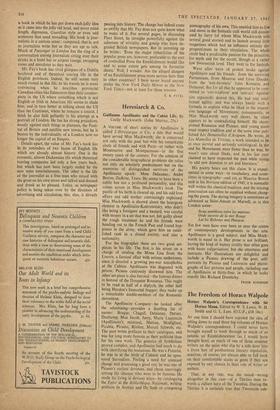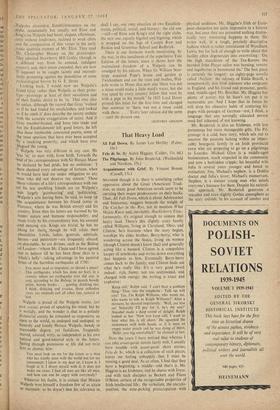The Freedom of Horace Walpole
Horace Walpole's Correspondence with Sir Horace Mann. Edited by W. S. Lewis, W. H. Smith and G. L. Lam. (O.U.P., f18 18s.) AT one time I should have rejected the idea of sitting down to read three big volumes of Horace Walpole's correspondence. 1 could never have brought myself to work through so much of so notable an Establishmenteer (as I would have thought him), so much of one of those amateur writers on the quiet who slip by a side door into a front box of posthumous literary reputation, sensitive, of course, yet always able to fall back on their comfortable status as gents if they are exposed by any chance in their role of writer or aesthete.
That, at any rate, was the mood—wrong altogether in this case—of a Thirties man to- wards a. culture hero of the Twenties. During the Thirties it is certainly true that Twentyish sub- Walpoles abounded, Establishmenteers on the make, occasionally but usually not Eton and king's (as Walpole had been), elegant, effeminate,
catty without tenderness, inclined to weak chins and the composition of thin verses in the early ironic quatrain manner of Mr. Eliot. They read
\I r. Christopher Hussey on the picturesque. I hey admired Strawberry Hill Gothic (though in a different way from its amused, indulgent creator); and, their totem extended, they are now (I suppose) to be caught faintly and intermit- tently protesting against the demolition of some ecclesiological horror by G. E. Street.
Looking back, I would now see Walpole's friend Gray rather than Walpole as their proto- type--prototype at least of their snootiness and of their frantic desire to be 'in.' That may also be unfair, although the record that Gray 'walked as if he had fouled his smallclothes, and looked as if he smelt it' does describe the snooty esthete with the accurate exaggeration of satire. And if Gray (mother-fixated, and born into trade and not the Establishment) left good letters, be left also those intolerable concocted poems, some of the most spurious that have ever been accepted .bY a toadying posterity, and which have ever plagued the young.
s " Walpole was very different in any case. He 'end 'in,' to start with, from birth. Towards the 'end of his correspondence with Sir Horace Mann he declared he had pride, but no ambition: 'I have shunned every advantage of fortune, when it would have laid me under obligation to any 1man who did not deserve my esteem.' These \three volumes of a life's cdrrespondence with one of his less sparkling friends are on Walpole's side largely `gazetteering' and 'politicising,' Walpole's aim having been, he said, to keep up the acquaintance between his friend (away in Florence, where he was British envoy) and his country. Even then his letters arc warmed by his tender nature and humane responsibility, and made lively by his extraordinary zest, his amused -and dancing eye. Kings are trivial, he has no liking for them, though he will relate their .absurdities. Lords, ladies, generals, admirals. heroes—and patriotism—are frequently absurd, or detestable. So are divines, such as the Bishop of London—'whom Mr. Chute and I have agreed not to believe till he has been three days in a whale's belly'—taking advantage in his pastoral letter of the harmless earthquake of 1750:
You never read so impudent, so absurd a piece!
This earthquake, which has done no hurt, in a country where no earthquake ever did any, is
sent, according to the Bishop, to punish bawdy prints, bawdy books . . . gaming, drinking (no, I think, drinking and avarice, those orthodox vices, arc omitted) and all other sins, natural or not.
Walpole is proud of the Walpole motto, fari qua. scnlial, proud of speaking his mind; but he
is worldly, and the wonder is that in a politely _dictatorial society he remained so responsive, so Open to the world, so undoped and unduped, so honestly and keenly Horace Walpole, bawdy in reasonable degree, yet fastidious, frequently moved, amused, witty, as independent as his own natural and good-natured style in the letters. Seeing through pretension or life did not twist him or dismay him: You must look on me for the future as a man who has totally done with the world but for my amusement. I know it, my dear sir, I know it. I laugh at it. I divert myself with it, it does not make me cross; I find all men are like all men; and how can one be angry with everybody? Whatever his faults, it is certain that Horace Walpole won himself a freedom few of us attain or -maintain; so he doesn't lose his relevance in,. shall. I say, our own' situation of• two Establish- ments, political, social, and literary: the old one —still—of Eton and King's and the right clubs, the new one, equally bigoted and bigoting, which is propped on the legs of Coalpit Row and Ruskin and Grammar School and Redbrick.
There is one footnote worth mentioning, by the way, in this instalment of the superlative Yale Edition of the letters, since it shows how the maintained freedom of a Walpole can be smudged by his editors. When Sir William Stan- hope acquired Pope's house and garden at Twickenham and cut the trees and bushes, Wal- pole wrote to Mann that now alas 'there was not a muse could make a little maid's water, but she was spied by every country fellow that went by with a pipe in his mouth.' In 1833 Lord Dover printed this letter for the first time and changed that sentence to `there was not a muse could walk there. . . .' Every later edition did the same ---until the present one.
GEOFFREY GRIGSON











































 Previous page
Previous page